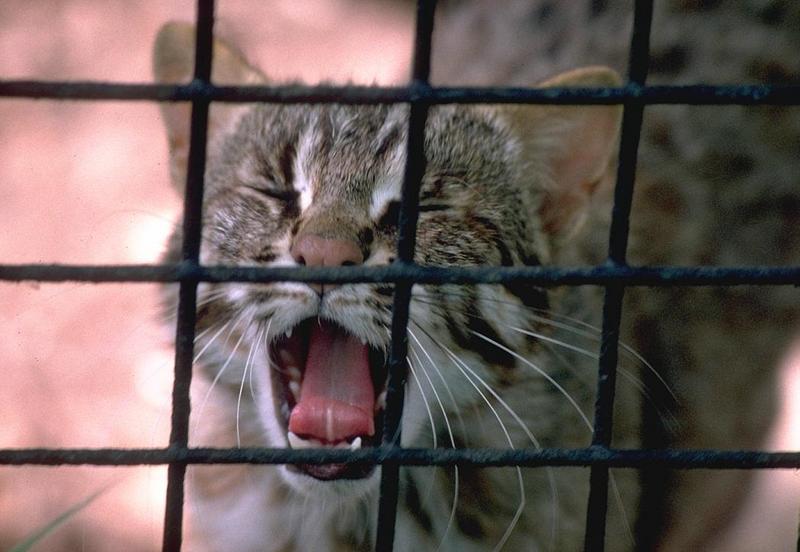|
| 질의: Large white | 결과: 82번째/2107 | |
Asian Leopard Cat (Prionailurus bengalensis) (삵(살쾡이))
| 제목: | Asian Leopard Cat (Prionailurus bengalensis) (삵(살쾡이))
| |

| 해상도: 1049x724
파일크기: 97092 Bytes
등록시간: 2004:11:18 13:13:16
|
From: PontiacV8
Newsgroups: alt.binaries.pictures.animals
Subject: Felt the need to contribute........
Date: Thu, 22 Jul 1999 19:03:12 +0100
Hi All!
After seeing some great Jaguar pix I searched for one in my archive, but
didn't find anything I've already scanned (gee must get down to this
scanning sometime....). Anyhoo, I saw this and thought of you all.
Amur Leopard at Basildon Zoo...
"WAHHHHHH! LET ME OUT!!!!"
filename="Amur_Leopard.jpg"
Comments
========
From: kokoski_m@bls.gov
Date: Fri Jul 23 19:52:01 KST 1999
File To Comment: New/Amur_Leopard-yawning-from_Basildon_Zoo.jpg
This is one of the smaller species of cat (possibly a golden cat,
but it's hard to tell from the photo.) I am sure, however, that it
is NOT an Amur leopard.
Thanks.
Mary
Comments
========
From: chakal@home.com
Date: Tue Jul 27 12:09:54 KST 1999
File To Comment: New/Amur_Leopard-yawning-from_Basildon_Zoo.jpg
Not an amur leopard! A wildcat, Felis sylvestris.
John Burkitt
Zooscape Program Director
Cougar Hill Sanctuary Association
Comments
========
From: espaa@aol.com
Date: Mon Aug 02 32:15:20 KST 1999
File To Comment: New/Amur_Leopard-yawning-from_Basildon_Zoo.jpg
This is an Amur Leopard Cat not an Amur Leopard.
Julie Wood
|
댓글 |
|---|
| | 손님 |
|
| Leopard Cat (Prionailurus bengalensis) is a small wild cat of Southeast Asia. On average it is as large as a domestic cat, but there are considerable regional differences: in Indonesia the average size is 45 cm, plus 20 cm tail, while it is 60 cm/40 cm in the Amur region. The fur is also quite variable: it is yellow in the southern populations, but silver-grey in the northern ones. The chest and the lower part of the head are white. Leopard Cats bear black markings, that may be - dependent on the subspecies - spots or rosettes. It is a nocturnal animal, and usually eats rodents, birds, fish, reptiles, small mammals. It is usually a solitary animal except for the mating season. It has litters of 2 to 4 kittens and the gestation period can vary from 65 to 70 days. |
| | Blaine |
|
| This might be an Amur leopard cat. First, u can tell from the nose, broad and well-developed, apparently different from house cats' nose, which is also a feature of the prionailurus order. Second, u can see the two white lines starting from the inner side of his eyes alongside the edge of his nose bridge running longitudinally through his ferehead, which is also a feature of leopard cats. Third, the powerful whited chin and the white front tips of his whisker pad also suggest this. Four, his ears are small and set apart and well back his head. Five, the fur coloration and the ghostly spotted body in the blurred background also can be noticed. Six, this definitely is not a golden cat, which has more powerful jaw and chin and looks exactly like a miniatured puma. |
| | 손님 |
|
| poor thing |
| | 손님 |
|
| may I ask, as there seems some expertise here, has anyone determined if any of these smaller cats are capable of being fertile with domestics? I know they've successfully crossed the leopard cat with F. catus to get the bengal, people desired the wild look without the wild traits, so the experiment was profitable. Can't think many would want a mini-cat, so I just wondered if it had ever been explored for purely scientific curiosity whether the smaller-than-domestics such as F. negripes and rubriginosa were close enough relatives to be fertile with them. And- O all right, will admit to being curious about all the near-in size wild 'cousins', scottish wildcats, spanish bobcats, any of the lynxes, how many really have been tested for cross fertility? Do we have hard facts on all of them? |
^o^
동물그림창고 똑똑전화 누리집
^o^
|
|
|